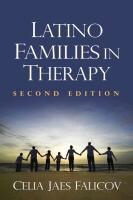Read more
Since its initial publication, this acclaimed work has provided a comprehensive conceptual framework and hands-on strategies for culturally competent clinical practice with Latino families and individuals. Practitioners and students gain an understanding of the family dynamics, migration experiences, ecological stressors, and cultural resources that are frequently shared by Latino families, as well as variations among them. Through in-depth case illustrations, the author shows how to apply a multicultural lens to assessment and intervention that draws on each client's strengths. Creative ideas are presented for addressing frequently encountered clinical issues and challenges at all stages of the family life cycle.
New to This Edition
*Reflects the ongoing development of the author's multidimensional model, including additional assessment/treatment planning tools.
*Incorporates the latest clinical research and over a decade of social and demographic changes.
*Chapter on working with geographically separated families, including innovative uses of technology.
*Chapters on health disparities and on adolescents.
*Expanded discussion of same-sex marriage, intermarriage, divorce, and stepparenting.
List of contents
I. Overview. 1. MECA: A Meeting Place for Culture and Therapy. 2. Latino Diversity: Contexts and Cultures. II. Migration and Acculturation. 3. Journeys of Migration: Losses and Gains. 4. Transnational Therapies: Separations and Reunifications. 5. The Second-Generation Identity Struggles: Roots and Wings. III. Ecological Contexts. 6. Health Disparities: The Need for Equal and Just Care. 7. Religion, Spirituality, and Traditional Healing Practices. 8. Racism, Ethnic Prejudice, and Discrimination. 9. The Challenge of School and Work. IV. Family Organization. 10. The Persistence of Extended Kin. 11. Couples: Presenting Issues and Approaches. V. Family Life Cycle. 12. Raising Children in Culture and Context. 13. Adolescents and Parents Crossing Cultural Borders. 14. Young, Middle, and Late Adulthood Transitions. VI. Conclusion. A Reflection: Finding Strengths.
About the author
Celia Jaes Falicov, PhD, is an internationally known family therapy author, teacher, and clinician. A clinical psychologist, she is Clinical Professor in the Department of Family and Preventive Medicine and the Department of Psychiatry at the University of California, San Diego, where she is also Director of Mental Health Services at the Student-Run Free Clinic. Past president of the American Family Therapy Academy (AFTA), Dr. Falicov is a Fellow of the American Association of Marriage and Family Therapists and the American Orthopsychiatric Association and a recipient of AFTA's Distinguished Contribution to Family Therapy Theory and Practice Award. She serves on the advisory boards of several family therapy journals. Dr. Falicov is well known for her writings on family transitions, migration, and cultural perspectives in family therapy practice and training. Her current work focuses on addressing the mental health care needs of underserved families, facilitating empowerment groups for Latino parents, and training medical students to think in terms of the impact of migration and culture on health risks and strengths.

